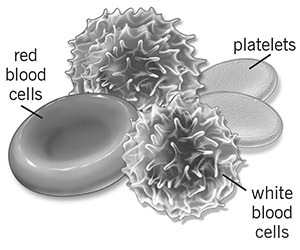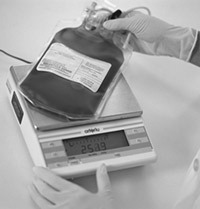Blood management
Blood conservation is an important part of Cleveland Clinic’s approach to surgery and patient care. Blood management means that Cleveland Clinic uses a variety of techniques, when possible, to manage blood before, during and after surgery to reduce the need for a blood transfusion. Blood transfusions are only used when necessary. Your doctor or surgeon can tell you if you might need a transfusion. Please talk with your surgeon or anesthesiologist about blood transfusions and personal blood conservation options that may be available to you.
What is a blood transfusion?

A blood transfusion is the delivery of blood parts through a vein to replace blood lost through injury, surgery or disease. These include:
- Red blood cells – carry oxygen to different tissues in the body.
- Platelets – small particles that help prevent and stop bleeding.
- Plasma – the liquid part of blood; replaces blood volume and clotting factors, which are substances in the blood that help it thicken and clot.
If you need blood, you have several options
If you need blood, your options may include:
- Taking supplements such as folate, Vitamin B12 or iron if you have anemia.
- Receiving blood from community donors.
- Receiving blood from donors that you have chosen (designated donors or directed donation).
- Using your own blood (autologous) donated before surgery or collected and returned during surgery (not a preferred method; for more information, please contact the American Red Cross).
These options may be limited by time, health factors and the type of surgery you are having. Your doctors will only recommend a blood transfusion when it is necessary. Cleveland Clinic respects your right to refuse blood and blood products regardless of the reason for refusal. It is important that you let your healthcare team know if you would like to refuse blood and blood products, and to release Cleveland Clinic from all liability of potential negative outcomes related to the refusal.
Treatment for anemia before surgery

Anemia is a condition that occurs when there are not enough red blood cells to carry the oxygen the body needs. If you are anemic and your surgery date is 4 or more weeks away, you should get treatment for anemia before surgery. Treatment may include medications and iron supplements.
For more information about Cleveland Clinic’s Blood Management program, talk to your doctor. You may need a referral to the Blood Management department.
You can contact Blood Management directly by calling 216.445.0245 or email bloodmgmtmain@ccf.org.
Receiving blood from community donors
Hospitals maintain a supply of blood collected by blood banks, such as the American Red Cross. The blood comes from community blood donors who are carefully screened for health problems and tested with the most accurate technology available.
Our nation’s blood supply is very safe. The risks associated with blood transfusions are very small. The chance that a unit (pint) of blood will transmit Human Immunodeficiency Virus (HIV, the virus that causes Acquired Immunodeficiency Syndrome [AIDS]) or hepatitis C is about 1 in 2 million. The chance that a unit of blood will transmit hepatitis B is less than 1 in 200,000. The risk of getting another serious infection is much less than the yearly risk of dying in a motor vehicle accident in the United States, which is approximately 1 in 4,300.
Using blood from designated/directed donors
Although the blood supply today is very safe, some patients prefer to get blood from people they know — called designated/directed donors. Blood from these donors is not safer than blood from volunteer community donors. Although designated donors must meet the same requirements as community donors, they may not want to disclose health issues to the patient, therefore their blood may actually be less safe.
Directed donation is possible only in certain situations. If the blood is a match for the patient and the surgery date is known, a directed donation is definitely possible.
If you choose a directed donor, you need to make arrangements well in advance of your surgery date because several days are needed for processing. Directed donations must be done at an American Red Cross location and require an appointment and doctor’s order. Additional costs may also apply.
Side effects of blood transfusions
Most patients who have a transfusion do not have any side effects. You may have mild side effects, such as feeling itchy or getting a rash or a fever with chills. Feeling faint, pain in the chest or back and shortness of breath are rare reactions. If you don’t feel well during the transfusion, please tell your nurse.
Before all procedures, it is very important to tell your healthcare team about any allergies you have, all medications you are taking, and if you have had any problems with blood transfusions before.
For more information
If you have questions about your options for blood transfusion, please ask your doctor or one of the transfusion medicine doctors at the Cleveland Clinic Blood Bank, 216.444.6542, or 800.223.2273, ext. 46542, Monday through Friday, 9:00 a.m. to 5:00 p.m.
For more information about the costs associated with blood transfusion, please call your insurance company or Cleveland Clinic’s Patient Financial Services department, 216.445.6249 or 800.223.2273, ext. 56249.
If you, a friend or family member have any questions about becoming a blood donor, please contact the American Red Cross or your local community blood bank. Blood donors give the gift of life every day.